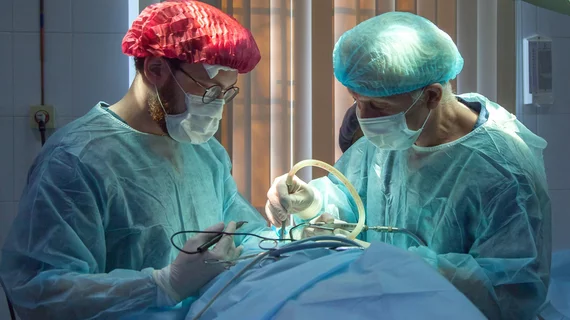4 ways AI may change plastic surgery
It has a ways to go in the field, but AI promises to modernize plastic surgery along both its main branches, cosmetic and reconstructive.
That’s according to a literature review running in Annals of the Royal College of Surgeons of England. Drs. Declan Murphy and Daniel Saleh of Newcastle upon Tyne Hospitals NHS Foundation Trust arrived at the observation after analyzing ongoing as well as completed scientific studies.
Before looking ahead in their study report, they note that AI has already been used to guide reconstructive surgeries during complex facial tumor resections. And in the cosmetic realm, a semi-supervised machine learning model had good agreement with human referees in classifying attractiveness.
Looking ahead, Murphy and Saleh describe several potential AI applications to watch for in plastic surgery. These include:
1. AI analysis of wrist x-rays could be used to improve the accuracy and efficiency of detecting closed fractures of the hands and digits. These injuries comprise a sizeable chunk of a plastic surgeon’s workload and, if improperly diagnosed, “can have profound implications for affected patients,” the authors write. “Automated image analysis will allow AI models to simultaneously interpret multiple images with increasing accuracy and reduced interrater variability.”
2. Centralized big data portals could collate information submitted by plastic surgeons across the world to create large databases for interpretation using AI algorithms. “These portals could accelerate our understanding of disease pathogeneses and genotypic risks,” write Murphy and Saleh, “and could deduce best-practice protocols for aspects of plastic surgery that currently lack robust evidence.” Such scenarios might include defining optimal margins for skin cancer excisions and predicting failures following oncological reconstructions, they add.
3. Three-dimensional planning, anatomical localization and surgical navigation could be combined to assist the surgeon in real-time decision making perioperatively. While current AI surgery-assistive systems are basic, it’s not difficult to envision a future in which they can complete relatively complex tasks. For example, the authors note, AI has shown promise in helping reduce time allotments for surgery and anesthesia while speeding recovery times. “Like other specialties, the cost–benefit analysis of robot assisted surgery in plastic surgery is unclear,” they write. “It should be determined before widely adopted in a national healthcare setting.”
4. AI may assist plastic surgeons in monitoring skin wound homeostasis, wound healing progress and physiological parameters in the future. For example, AI may predict the healing time of burns and help inform surgeons of the most appropriate management for patients. “Similarly, following an injury, patient photographs could be processed to determine a wound’s size, color and tissue oximetry,” the authors write, “which then would inform patients on how best to self-manage their wound in the community using machine learning led technology in an interface such as a smartphone.”
“The partnership between AI and plastic surgery is in its infancy, but developments are rapid and promising,” Murphy and Saleh conclude. “It is important for surgeons to collaborate with computer scientists so outcomes are directed toward improving patient care and to understand important limitations and ethical concerns relating to implementing AI into everyday surgical practices.”
The journal has posted the study in full for free.

